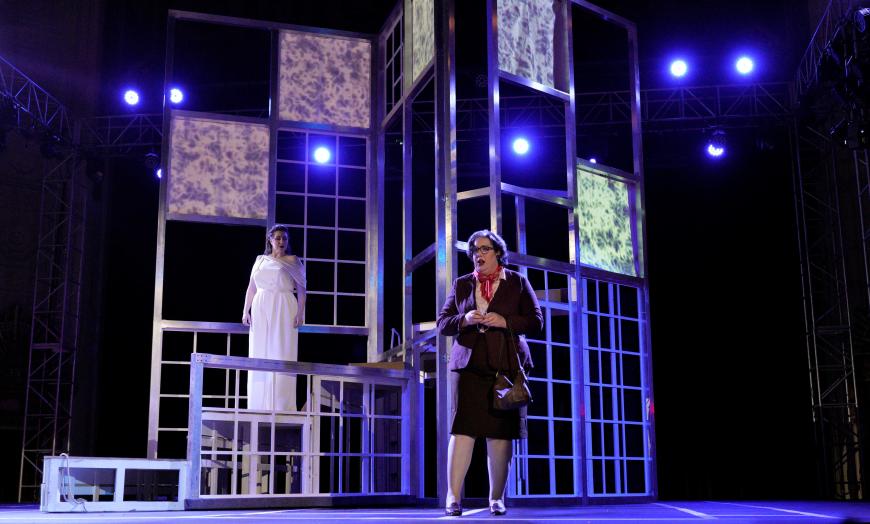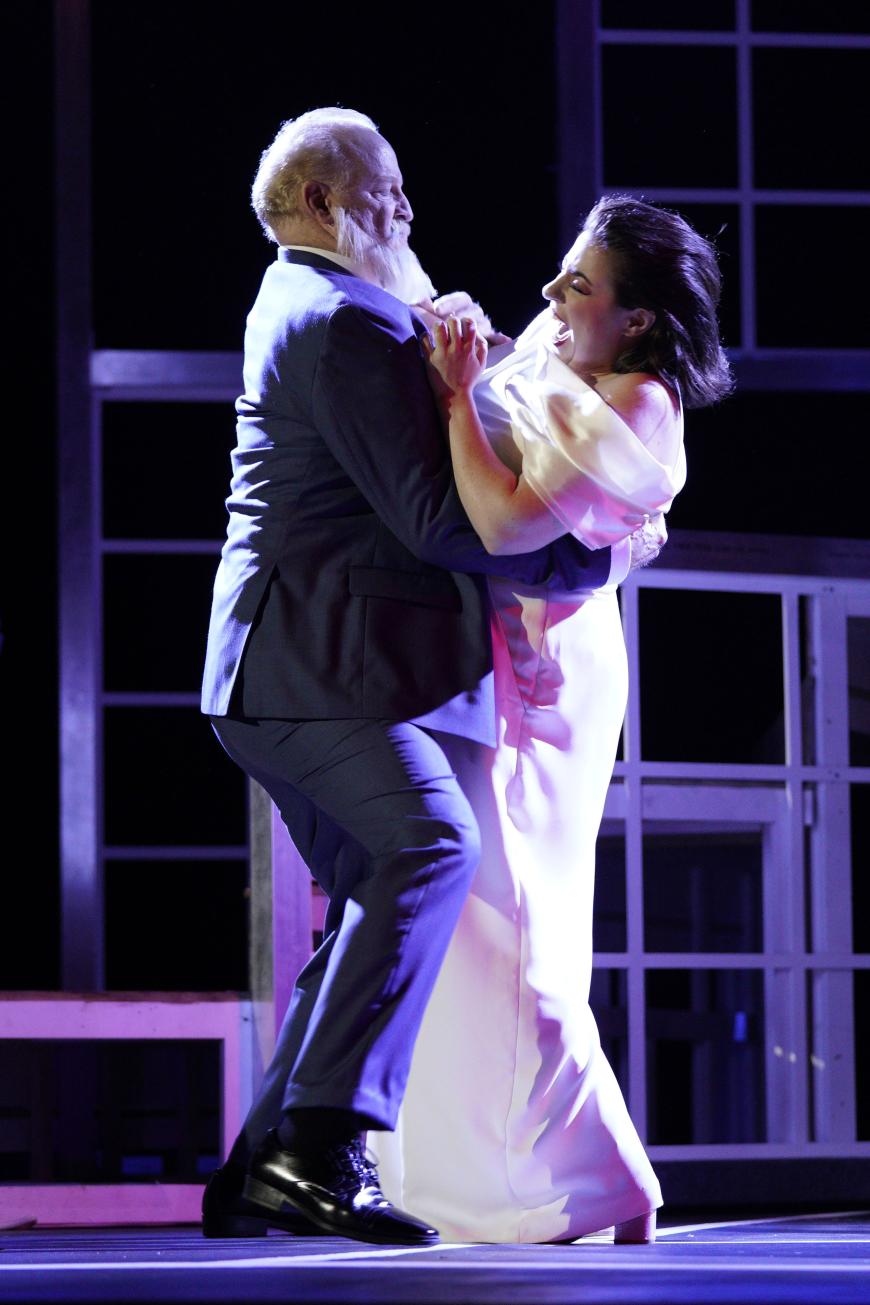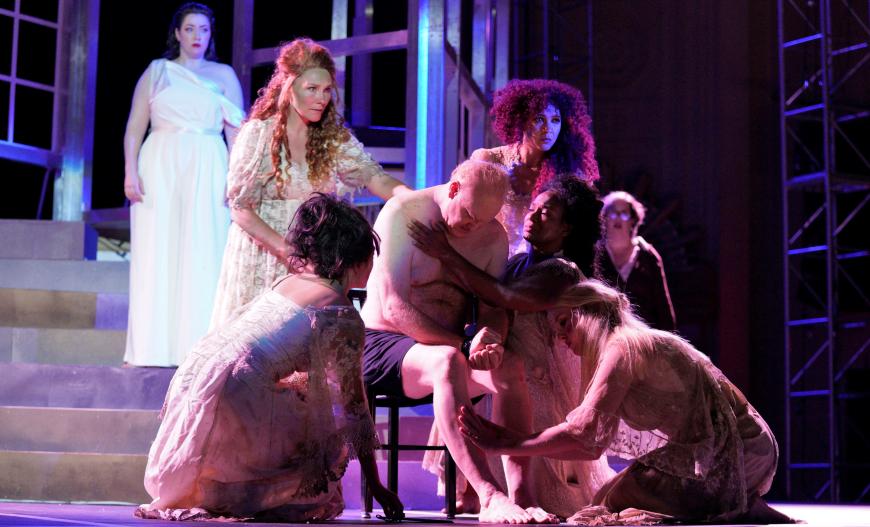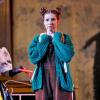
Opera lovers who know the sinister wife-hoarding title character from Bartók’s 1911 Bluebeard’s Castle will have their memories, minds, and hearts whirled by Paul Dukas’ Ariane & Bluebeard (Ariane et Barbe-bleu), a work that preceded its more celebrated musical adaptation of this dark tale by five years.
In a ravishing rediscovery, West Edge Opera brought this 1906 piece to vivid, transfixing life on Sunday, July 24, at the Oakland Scottish Rite Center. Peak musical theater events like this one don’t come along often. Two chances to catch it remain, with performances on July 29 and Aug. 6.
In contrast to Bartók’s Castle, which is based on a tale by Charles Perrault, Dukas’ Ariane taps a psychologically probing text by the Belgian playwright Maurice Maeterlinck, many of whose plays were transformed into operas — none more famously than Pelléas et Mélisande. In words, music, and emotional effect, Ariane shares certain aspects with Debussy’s 1902 masterwork.
There’s a character named Mélisande here and more than a few vocal and orchestral passages that echo and at one point quote from Debussy’s shifting musical eddies and tides. More importantly, like Pelléas et Mélisande but on its own striking terms, the Dukas/Maeterlinck opera burrows into the deep, mysterious contours of its characters’ inner lives and murky motivations.

In three acts running two compact hours, Ariane & Bluebeard lays bare the pulse beat and paradoxes of love and obsession. It does so with a score, by a composer probably best known for the Mickey Mouse version of The Sorcerer’s Apprentice in the Disney film Fantasia, that broods and sparkles, murmurs and swells, to Wagner-like furies and raptures. Here is a Paul Dukas many listeners will be encountering for the first time.
In a commanding lead performance, mezzo-soprano Renée Rapier plays Ariane, Bluebeard’s next yet anything-but-passive new wife. Before she arrives, a band of restive locals is already buzzing uneasily about what may have happened to her predecessors. Circling the abstract castle walls (Liliana Duque Piñeiro’s unit set evokes the white grid sculptures of Sol LeWitt), the chorus members carry electric torches and rant in densely emphatic harmonies.
Accompanied by her seemingly dowdy Nurse (contralto Sara Couden in a vital, fearless performance), Ariane has the regal bearing of a Greek goddess. The tunic-like white shift she wears (in Christine Crook’s excellent costume design) reinforces the impression. Both women sing with splendid, shining authority, their voices and personalities set off in vaulting, dramatically gratifying ways.
In her quest to penetrate Bluebeard’s castle and the treasures and secrets it contains, Ariane deputizes the Nurse to open one room after another with the silver keys she possesses. Over bright splashes and shimmers of orchestral color, the Nurse experiences each bejeweled chamber as a new erotic thrill, shedding layers of her clothing as she does. It’s one of various and telling uses of costumes — shed in some cases and clutched tight as protective covering in others — in director Alison Pogorelc’s fine, keenly physicalized production.
The master of the house (bass-baritone Philip Skinner) is a haunted, spectral figure. He’s given a scant few lines to sing and spends much of the opera hounded by his past deeds, self-flagellating shame, and a community bent on punishing him. Stripped to his underwear in one harrowing sequence, he runs terrified through the rotunda auditorium’s sweeping, curved aisles.

Using a last golden key and her own becalmed courage, Ariane breaks through to the dungeon where Bluebeard’s five wives cower in ball gowns they might have been wearing since their doomed wedding days. In their delicate, porous singing and stricken acting, the women are utterly convincing as afflicted survivors. Silvie Jensen, Aléxa Anderson, Candace Johnson, Taylor See, and Sharon Shao inscribe themselves on a listener’s empathic heart.
The opera’s conclusion may well disquiet contemporary viewers. As Ariane and the Nurse depart, the other wives choose to remain behind with their oppressor, gently tending to Bluebeard’s wounds. Or is it a choice, one is left to wonder uncomfortably. Oppressor and oppressed remain locked in a prison of their past. The mirrors they brandish may only reflect their own fates more clearly.
The uniformly stellar vocal performances were supported and enhanced throughout at the opening performance by a large orchestra under music director Jonathan Khuner’s urgent, sensitive baton. Leslie Chin, on flute and piccolo, provided an especially piquant gleam, by turns nimble, joyful, and plaintive. Here, as everywhere in this superb production of an absorbing early 20th-century opera, the stars aligned in a darkly glittering sky.



